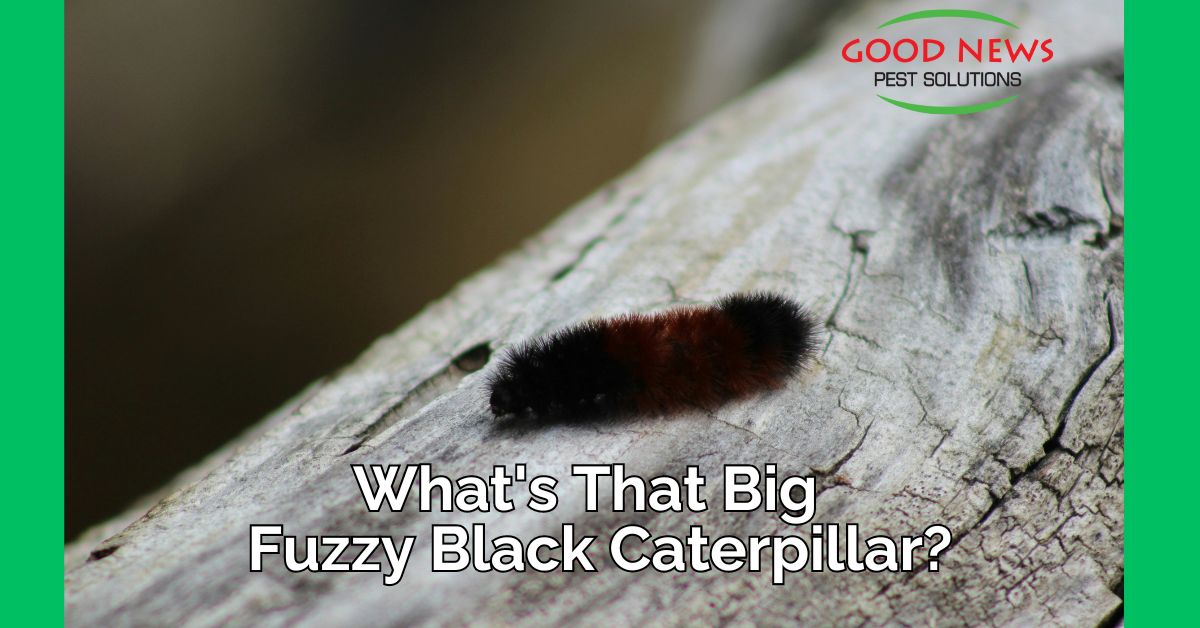
What's That Big Fuzzy Black Caterpillar??
Picture it. You come out onto your front porch to grab a late-in-the-day Amazon delivery. As you’re straightening up, you see it – a fuzzy blob on your bougainvillea.
You look closer and realize it’s a black, wooly bear caterpillar with faint red bands. You carefully touch it and it curls up, letting you see the red bands more clearly. The dog sniffs at it; he isn’t interested. And so you toss it out into your yard and forget about it.
A few days later, you see a big moth crawling over the edge of your driveway. It’s 2-3 inches wide, white, with black and white spots ringed by black edges. The discarded caterpillar has transformed into Hypercompe scribonia, a giant leopard moth.
Springtime Broods
While our weather patterns don’t often reflect the seasons our neighbors to the North deal with, many of the lower orders of creatures still follow their instinctual, God-ordained habits and life cycles.
Even though we rarely saw temperatures drop below the 70s, we’re technically about to leave spring behind for the summer. So the caterpillars and moths of the family Erebidae are shaking off their hibernation and finishing their development and metamorphosis.
The caterpillars and moths are found from southern Ontario, Canada south to Florida and west to Minnesota and Texas. Above the Mason-Dixon line, they only have one brood per year. In our area they usually have two. Their mating ritual is somewhat strange too – it can last more than 24 hours, with the larger male covering over the female. If it gets too hot they’ll shuffle over to shade or head into the sun if it gets too cool.
Plant to Plant Life
One thing we don’t quite understand about the giant leopard moths is their propensity to hop from food source to food source. They may start munching on your bougainvillea, then make their way to a discarded Christmas poinsettia. Later, they’ll climb up and snack on your citrus leaves – oranges or lemons – then check out the castor bean, avocado, and plantain leaves.
An advantage these caterpillars do offer is some natural control over plants we consider weeds or invasive. In fact, these caterpillars have one of the widest ranging food selections of any animal. What’s more, scientists speculate that the dozens of plants they’ve identified is still only scratching the surface of their diet.
University of Florida researchers say this “food-mixing” means they’ll often snack on plants with some toxic chemicals – chemicals that they manage to digest, so they don’t affect the caterpillar. But for what purpose? Some entomologists have suggested it’s so they can use the poison products to defend against some parasites, but experiments have proved inconclusive.
Defending the Mechanism
Always be careful picking up a caterpillar. There are some who express noxious chemicals, or can scratch, cut or infect you with their spines, causing severe allergic reactions. Some spiny protrusions are too fine to see and can be embedded in your skin. Thankfully, this particular caterpillar won’t do any damage to you.
Their number one defense mechanism is curling up into a tight ball – when you see the red bands, it’s all but impossible to get them to reopen while they sense a threat. The curling protects their softer spots and the red banding wards off birds and other predators.
The worst that can happen is the adult moth will sometimes secrete a foul-smelling yellow substance when handled. It’s not dangerous to humans, except for the odor.
While you may see a bunch of these moths clustered around your outside lights from April to September, they’re not really a nuisance.
That’s not the case with so many other insects out there. Our Go Green Perimeter Plus is our most popular solution because it takes care of the majority of the annoying creepy crawlies we find in Florida homes. It’s safe for your family, your pets and the planet, while being effective and affordable. For more details, or to schedule your first inspection and treatment, please give us a call!
Proudly Serving
Sun City Center, Ruskin, Palmetto, Parrish, Ellenton, Bradenton, Anna Maria, Holmes Beach, Bradenton Beach, Longboat Key, Lakewood Ranch, University Park, Myakka City, Sarasota, Siesta Key, Osprey, Nokomis, Casey Key, Venice, Englewood, North Port, Port Charlotte, Punta Gorda, Arcadia
Things You Can Do
Pay Your Bill Online
Leave Us a Review
Request a Free* Termite Inspection
Stop Mosquito Bites
Get Rid of Rodents
Get a Termite Damage Warranty
Get Pest Control for Your Attic
Get Pest Control for Your Business Request Prayer
Corporate Address
1080 Enterprise Court, Ste A
North Venice, FL 34275
Call Now: (941) 412-9610
Text: (941) 412-9610
Fax: (941) 412-0080
